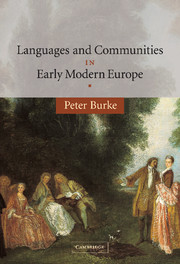Book contents
- Frontmatter
- Contents
- Acknowledgements
- Chronology 1450–1794
- Prologue: communities and domains
- 1 ‘Speak, that I may see thee’: the discovery of language in early modern Europe
- 2 Latin: a language in search of a community
- 3 Vernaculars in competition
- 4 Standardizing languages
- 5 Mixing languages
- 6 Purifying languages
- Epilogue: languages and nations
- Appendix: languages in Europe 1450–1789
- Bibliography
- Index
6 - Purifying languages
Published online by Cambridge University Press: 07 December 2009
- Frontmatter
- Contents
- Acknowledgements
- Chronology 1450–1794
- Prologue: communities and domains
- 1 ‘Speak, that I may see thee’: the discovery of language in early modern Europe
- 2 Latin: a language in search of a community
- 3 Vernaculars in competition
- 4 Standardizing languages
- 5 Mixing languages
- 6 Purifying languages
- Epilogue: languages and nations
- Appendix: languages in Europe 1450–1789
- Bibliography
- Index
Summary
One reason for believing that the mixing of languages was increasing in the early modern period comes from the vehemence of the reaction against such mixing. Scholarly discussions of the movements for linguistic purity of the nineteenth and twentieth centuries are relatively common. Some of these movements were nationalist, like the Greek and the German crusades against foreign words (below, p. 169). Others were essentially literary, efforts by poets such as Stéphane Mallarmé ‘to purify the dialect of the tribe’ as he put it (donner un sens plus pur au mots de la tribu). Mallarmé dreamed of an ideal world described in an ideal language.
Although they have attracted much less scholarly attention, movements of linguistic purification in early modern Europe were neither uncommon nor unimportant. They were the negative side of the standardization and codification of language described in chapter 4. Attempts to make the vernaculars more uniform and more dignified entailed rejecting many words and certain forms of syntax and pronunciation.
At least three different kinds of purity were advocated. Language had to be morally pure, as opposed to ‘talking dirty’: the Dictionary of the French Academy excluded what the preface called ‘swearwords or those which offend modesty’ (termes d'emportement ou qui blessent la pudeur). Language also had to be socially pure, in other words to follow the usage of the upper classes.
- Type
- Chapter
- Information
- Languages and Communities in Early Modern Europe , pp. 141 - 159Publisher: Cambridge University PressPrint publication year: 2004

